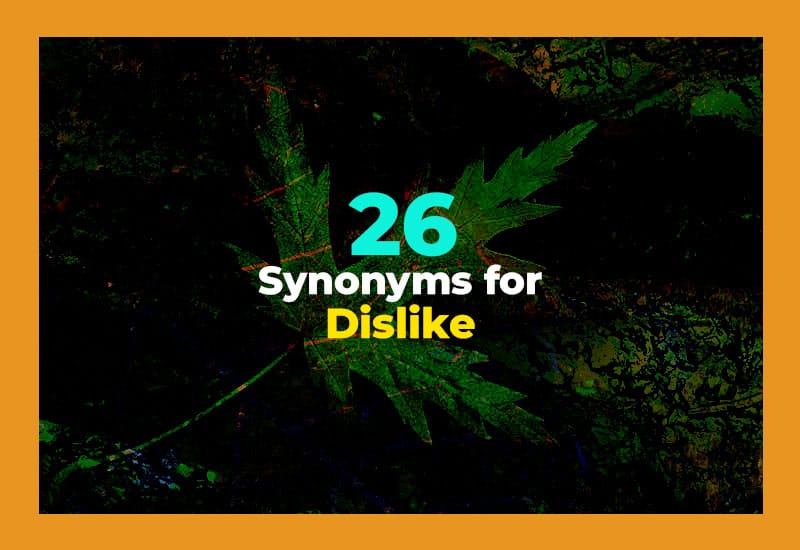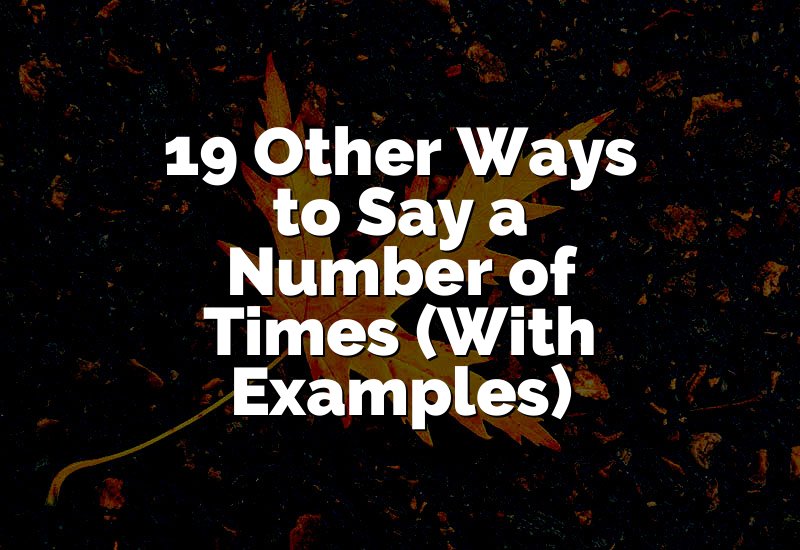You know that feeling when you just don't like something? Maybe you hate a certain food, detest a chore, or loathe waking up early. We all feel it sometimes. Today, we will explore 26 fun and simple words you can use instead of "dislike" in your daily life.
1. Hate
Hate means you really do not like something. It is a very strong feeling. For example, "I hate waiting in long lines." Or, "She hates broccoli on her plate." Hate is strong and clear. You can use it when you really feel annoyed or upset. It shows extreme dislike. Hate is easy to use in daily life and lets people know your feelings strongly. It is simple, direct, and common.
2. Detest
Detest means you strongly dislike something. For example, "He detests loud music in the morning." Or, "I detest doing homework on weekends." It is like hate but a little more formal. Detest is clear and serious. You can use it to show dislike in polite ways. It shows strong feelings without using harsh words. It is good for writing, speaking, or expressing a firm opinion clearly.
3. Loathe
Loathe means you feel strong disgust or dislike. For example, "She loathes cleaning the bathroom." Or, "I loathe people who lie." Loathe is stronger than just not liking. It shows strong negative feelings. You can use it to describe actions, people, or things. Loathe works well in speech or writing. It is a clear word for strong dislike. People understand your feelings easily when you use it.
4. Abhor
Abhor means you feel strong dislike and disgust. For example, "He abhors cruelty to animals." Or, "I abhor unfair treatment at work." Abhor is formal and strong. It shows that something is not acceptable. It is often used in serious writing or speech. You can show moral dislike or personal dislike. Abhor is perfect for essays, letters, or serious conversations. People will understand your deep dislike clearly.
5. Despise
Despise means you look down on something or someone. For example, "She despises cheating in games." Or, "I despise rude behavior." It is a mix of dislike and disrespect. You can use it for actions or people. Despise is strong and clear. It is easy to use in writing and speaking. When you despise, you show feelings strongly and clearly. People understand you do not approve at all.
6. Shun
Shun means you avoid something or someone on purpose. For example, "He shuns junk food." Or, "She shuns negative people." It is a polite way to show dislike. Shun shows action, not just feeling. You avoid, stay away, or refuse something. It is good for writing or everyday talking. People see that you do not want to be near that thing or person. It is simple and clear.
7. Spurn
Spurn means you reject something because you dislike it. For example, "He spurned the offer politely." Or, "She spurned the rude comment." It shows strong refusal and dislike. Spurn is formal but easy to use. You can reject ideas, gifts, or actions. It is clear and direct. People understand that you do not want to accept it. Spurn works well in polite writing or speaking. It shows dislike respectfully.
8. Disdain
Disdain means you show dislike with disrespect. For example, "She looked at the messy room with disdain." Or, "He disdains bad manners." It is a mix of dislike and judgment. Disdain is often for people or actions. It is formal and strong. You can use it to show you are unhappy or do not approve. Disdain is clear, serious, and works in writing or conversation. It is easy to understand.
9. Repel
Repel means something makes you feel strong dislike or disgust. For example, "The smell of trash repels me." Or, "He is repelled by lies." It is often about things or actions. Repel shows natural dislike. It is simple and clear. You can use it in writing or speaking. People understand you do not want to touch, see, or accept it. Repel is strong and effective.
10. Aversion
Aversion means a strong feeling of dislike. For example, "She has an aversion to spiders." Or, "He has an aversion to cold weather." It is often about personal feelings. Aversion shows natural reaction or habit. You can use it in daily life or writing. People know you avoid or dislike something. Aversion is polite and clear. It works well in speech, school, or essays.
11. Antipathy
Antipathy means a natural dislike for something. For example, "He feels antipathy toward bullies." Or, "She has antipathy for loud noises." It is formal but easy to understand. Antipathy shows natural feelings, not temporary moods. You can use it in writing or speaking. People see you do not like it at all. Antipathy works for people, actions, or things. It is simple, clear, and strong.
12. Distaste
Distaste means mild dislike or disapproval. For example, "She has a distaste for spicy food." Or, "He shows distaste for gossip." It is not very strong. Distaste is polite and easy to use. You can use it for actions, things, or habits. People understand your dislike clearly. Distaste is common in writing and daily life. It is simple and polite. It is a soft way to show negative feelings.
13. Irritate
Irritate means to annoy or make someone dislike something. For example, "The loud alarm irritates me." Or, "He is irritated by slow service." It is about small or repeated dislike. Irritate shows reaction to actions or sounds. You can use it in everyday speech. People know you are bothered or unhappy. Irritate is simple and common. It is clear and easy to understand. It shows dislike in a gentle way.
14. Offend
Offend means to hurt feelings or cause dislike. For example, "His joke offended her." Or, "The rude comment offended everyone." Offend shows dislike caused by words or actions. You can use it politely in speech or writing. People understand you feel upset or unhappy. Offend is clear and common. It is easy to use in daily life. It is not very strong but shows dislike clearly.
15. Resent
Resent means to dislike because of unfair treatment. For example, "She resents being ignored." Or, "He resents the extra work." It shows personal dislike and feeling of unfairness. Resent is polite and serious. You can use it in speech, writing, or daily life. People understand your negative feelings. Resent is clear and easy to use. It works well for emotions, actions, or events.
16. Reject
Reject means to refuse because you dislike or do not accept. For example, "He rejected the wrong advice." Or, "She rejected the bad food." It is simple and clear. Reject can be for ideas, actions, or things. People understand your feelings. Reject is polite and effective. It shows dislike or refusal. It works in daily life and writing. It is easy to understand and direct.
17. Nauseate
Nauseate means to feel strong disgust or dislike. For example, "The rotten food nauseates me." Or, "His rude words nauseate her." It is strong and clear. Nauseate is often about smells, sights, or actions. People understand the feeling quickly. It is polite but shows extreme dislike. Nauseate is good for writing and speaking. It is easy to understand and effective. It clearly shows physical or emotional dislike.
18. Revolt
Revolt means strong dislike causing reaction or rejection. For example, "The unfair rule revolts the students." Or, "The violent scene revolted the audience." It is formal but easy to use. Revolt shows strong feelings and emotional reaction. You can use it in writing or speech. People understand the dislike clearly. Revolt is strong, simple, and effective. It works for actions, events, or behaviors.
19. Disfavor
Disfavor means lack of approval or liking. For example, "The new policy is in disfavor with workers." Or, "She found herself in disfavor after the mistake." Disfavor is formal but clear. It shows dislike without harsh words. You can use it for people, actions, or events. People understand your opinion. Disfavor works in writing, school, or work. It is polite, simple, and easy to use.
20. Contempt
Contempt means dislike mixed with disrespect. For example, "He looked at the liar with contempt." Or, "She felt contempt for rude people." Contempt shows strong negative feelings. It is formal but clear. You can use it in writing, speech, or daily life. People understand strong dislike and judgment. Contempt is simple and direct. It is good for expressing serious feelings politely.
21. Loathing
Loathing means extreme dislike or hatred. For example, "He has a loathing for snakes." Or, "She feels loathing toward unfair treatment." Loathing is strong and clear. You can use it in writing or speech. People understand strong emotional dislike. Loathing works for objects, actions, or people. It is simple, direct, and very clear. It shows feelings strongly and politely.
22. Repugnance
Repugnance means strong feeling of dislike or disgust. For example, "She felt repugnance for the dirty room." Or, "He shows repugnance toward cheating." Repugnance is formal but clear. It is strong and serious. You can use it in writing, speech, or essays. People understand strong dislike and avoidance. Repugnance works for objects, actions, or people. It is easy to understand. It shows strong negative feelings.
23. Abomination
Abomination means something hated or very offensive. For example, "Violence is an abomination to him." Or, "She considers lying an abomination." It is formal and strong. Abomination shows deep dislike and moral judgment. You can use it in writing or speech. People understand your strong feelings. Abomination works well for serious dislike. It is simple and clear. It expresses strong feelings effectively.
24. Aversionate
Aversionate is a less common word for strong dislike. For example, "He aversionates sugary drinks." Or, "She aversionates loud music." It is creative but clear. Aversionate shows natural dislike. You can use it in writing or casual speech. People understand dislike quickly. It is polite, simple, and effective. Aversionate works for things, actions, or habits. It is easy to understand and direct.
25. Ill will
Ill will means feeling dislike or hostility. For example, "He harbors ill will toward his rival." Or, "She shows ill will to those who cheat." It is clear and simple. Ill will shows feelings and actions. You can use it in writing, speech, or everyday life. People understand your negative feelings. Ill will works for people, actions, or events. It is direct, polite, and strong.
26. Coldness
Coldness means emotional distance due to dislike. For example, "His coldness hurt her feelings." Or, "She showed coldness to rude guests." Coldness is polite and clear. It shows dislike without harsh words. You can use it in writing, speech, or daily life. People understand your feelings. Coldness works for people, actions, or events. It is simple, effective, and polite.
Final Thoughts
Using different words for dislike makes your speech and writing more interesting. Words like hate, loathe, or abhor express strong feelings. Polite words like distaste or aversion work in daily life. Choosing the right word helps others understand your feelings clearly. Using these synonyms makes communication precise and powerful. Always pick the word that matches the situation.

| Synonym | Meaning | Example |
|---|---|---|
| Hate | Strong dislike | He hates waiting in long lines. |
| Detest | Strong dislike | He detests loud music in the morning. |
| Loathe | Extreme dislike | She loathes cleaning the bathroom. |
| Abhor | Strong moral dislike | He abhors cruelty to animals. |
| Despise | Dislike with disrespect | She despises cheating in games. |
| Shun | Avoid intentionally | He shuns junk food. |
| Spurn | Reject with dislike | He spurned the offer politely. |
| Disdain | Dislike with contempt | She looked at the messy room with disdain. |
| Repel | Cause aversion | The smell of trash repels me. |
| Aversion | Strong feeling of dislike | She has an aversion to spiders. |
| Antipathy | Natural dislike | He feels antipathy toward bullies. |
| Distaste | Mild dislike | She has a distaste for spicy food. |
| Irritate | Annoy or bother | The loud alarm irritates me. |
| Offend | Hurt feelings | His joke offended her. |
| Resent | Dislike due to unfairness | She resents being ignored. |
| Reject | Refuse due to dislike | He rejected the wrong advice. |
| Nauseate | Cause disgust | The rotten food nauseates me. |
| Revolt | Strong dislike causing reaction | The unfair rule revolts the students. |
| Disfavor | Lack of approval | The new policy is in disfavor with workers. |
| Contempt | Dislike with disrespect | He looked at the liar with contempt. |
| Loathing | Extreme dislike | He has a loathing for snakes. |
| Repugnance | Strong dislike or disgust | She felt repugnance for the dirty room. |
| Abomination | Something very hated | Violence is an abomination to him. |
| Aversionate | Act of disliking | He aversionates sugary drinks. |
| Ill will | Feeling of hostility | He harbors ill will toward his rival. |
| Coldness | Emotional distance | His coldness hurt her feelings. |









